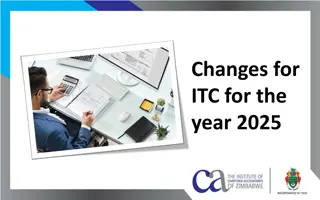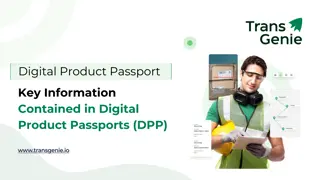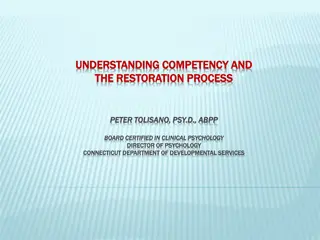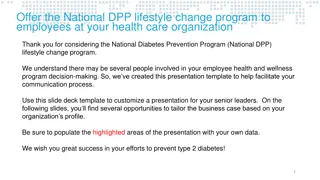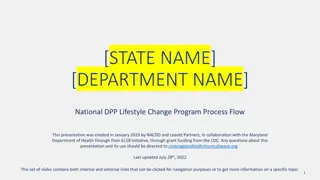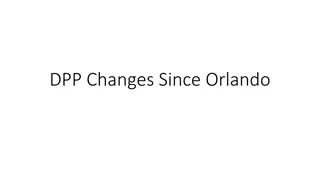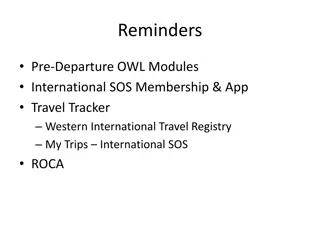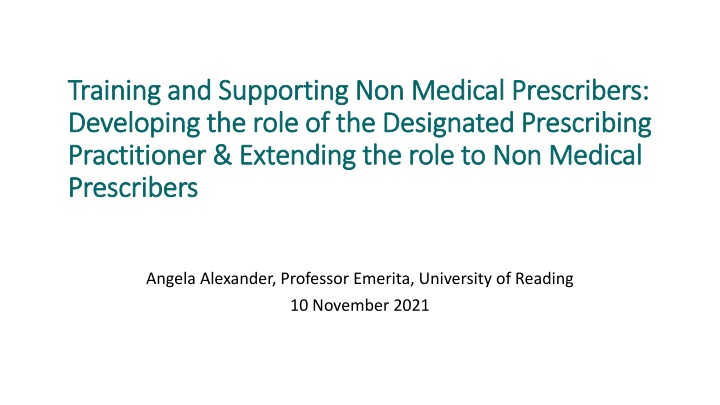
Supporting Non-Medical Prescribers: Competency Framework and Regulatory Changes
Explore the development of a new competence framework to support governance and accountability for non-medical prescribers, including regulatory changes enabling supervisors with suitable qualifications. Learn about the NMC and HCPC changes to facilitate this transition effectively.
Download Presentation

Please find below an Image/Link to download the presentation.
The content on the website is provided AS IS for your information and personal use only. It may not be sold, licensed, or shared on other websites without obtaining consent from the author. If you encounter any issues during the download, it is possible that the publisher has removed the file from their server.
You are allowed to download the files provided on this website for personal or commercial use, subject to the condition that they are used lawfully. All files are the property of their respective owners.
The content on the website is provided AS IS for your information and personal use only. It may not be sold, licensed, or shared on other websites without obtaining consent from the author.
E N D
Presentation Transcript
Training and Supporting Non Medical Prescribers: Training and Supporting Non Medical Prescribers: Developing the role of the Designated Prescribing Developing the role of the Designated Prescribing Practitioner & Extending the role to Non Medical Practitioner & Extending the role to Non Medical Prescribers Prescribers Angela Alexander, Professor Emerita, University of Reading 10 November 2021
My task (and yours) My task (and yours) supporting governance and accountability enabling non-medical prescribers (NMPs) to take on this designated practitioner role the new Competency Framework for Designated Prescribing Practitioners how to evidence competence in the DPP role moving forward
A new competence framework A new competence framework to support governance and to support governance and accountability accountability regulatory changes in 2018/19 enabled some non-medical prescribers (NMPs) to take on role of supervising and confirming competence during the period of learning in practice in addition to Designated Medical Practitioners (DMPs) there was a need to ensure that those who took on the role were suitable framework was developed with representatives from all prescribers, regulators, education providers and patients.
NMC changes to enable this to happen NMC changes to enable this to happen Prescribing students can be supervised and assessed by any registered healthcare professional (including a nurse or midwife) who is an experienced prescriber with suitable equivalent qualifications for the programme the student is undertaking. The role is split into: Practice Supervisor (PS) Practice Assessor (PA) The change applies to all NMC approved prescribing programmes from September 2020.
HCPC changes to enable this to happen HCPC changes to enable this to happen Practice Educators (PE) must be a qualified prescriber, on the register of their statutory regulator with annotation(s) for prescribing where applicable and with the relevant skills, knowledge and experience to support safe and effective learning. Practice educators must undertake regular training which is appropriate to their role, learners needs and the delivery of the learning outcomes of the programme. Took effect from 1 September 2019
GPhC changes to enable this to happen GPhC changes to enable this to happen Prospective designated prescribing practitioners (DPP) must have: active prescribing competence applicable to the areas in which they will be supervising appropriate patient-facing clinical and diagnostic skills supported or supervised other healthcare professionals, and the ability to assess patient-facing clinical and diagnostic skills Effective for all programmes which are reaccredited after publication
Aims of the generic DPP role Aims of the generic DPP role To oversee, support and assess the competence of non- medical prescribing trainees, in collaboration with academic and workplace partners, during the period of learning in practice
Structure of the DPP Structure of the DPP competence framework competence framework
As we go through the framework As we go through the framework Think about: preparing to undertake the role or supporting others to do the role any potential challenges (think back to your own training) the learning environment and governance of the period of learning in practice what evidence could you, or others, provide to evidence each competence
1 DPP: Personal characteristics 1 DPP: Personal characteristics The practitioner taking on the DPP role: 1.1 Recognises the value and responsibility of the DPP role 1.2 Demonstrates clinical leadership through their practice 1.3 Demonstrates a commitment to support trainees 1.4 Displays professional integrity, is objective in supervision and/or assessment 1.5 Is open, approachable and empathetic 1.6 Creates a positive learning culture through their practice
2 DPP: Professional skills and knowledge 2 DPP: Professional skills and knowledge The practitioner taking on the DPP role: 2.1 Works in line with legal, regulatory, professional and organisational standards 2.2 Is an experienced prescriber* in a patient facing role 2.3 Is an active prescriber** in a patient-facing role, with appropriate knowledge and experience relevant to the trainee s area of clinical practice 2.4 Has up-to-date patient-facing, clinical and diagnostic skills and evidence of demonstrating competence in an area of practice relevant to the trainee 2.5 Has knowledge of the scope and legal remit of non-medical prescribing for the NMP trainee s profession
Definitions Definitions An experienced prescriber is defined as an active prescriber who would normally have at least 3 years recent prescribing experience An active prescriber consults with patients and makes prescribing decisions based on clinical assessment with sufficient frequency to maintain competence. Reflects and audits prescribing practice to identify developmental needs.
3 DPP: Teaching and training skills 3 DPP: Teaching and training skills The practitioner taking on the DPP role: 3.1 Has experience or had training in teaching and/or supervising in practice 3.2 Has knowledge, either experiential or through formal training, of different teaching methods to facilitate learning in practice and adapt to individual student needs 3.3 Articulates decision making processes and justifies the rationale for decisions when teaching or training others 3.4 Has knowledge of a range of methods of assessment and experience of conducting assessment of trainees in clinical practice 3.5 Delivers timely and regular constructive feedback 3.6 Facilitates learning by encouraging critical thinking and reflection
4 Delivering the role: Working in partnership 4 Delivering the role: Working in partnership In delivering the role, the DPP is able to: 4.1 Work with the trainee to establish their baseline knowledge and skills, and jointly create a development plan for meeting learning outcomes 4.2 Regularly assess the trainee at appropriate intervals to guide gradual handover of elements of the process that lead to a prescribing decision 4.3 Work in partnership with the trainee, other practitioners and the programme provider to confirm the competence of the trainee 4.4 Recognise own limits in capacity, knowledge and skills and areas of practice where other practitioners may be better placed to support learning 4.5 Advocate and facilitate a multidisciplinary team (MDT) approach to training by encouraging the trainee to learn from other appropriate practitioners
5 Delivering the role: Prioritising patient care 5 Delivering the role: Prioritising patient care In delivering the role, the DPP is able to: 5.1 Ensure that safe and effective patient care remains central to practice through effective clinical supervision 5.2 Ensure patients are informed of and consent to trainee presence at consultations 5.3 Identify and respond appropriately to concerns regarding the trainee s practice or behaviour 5.4 Act in the interest of patient and public safety when making decisions on trainee competence
6 Delivering the role: Developing in the role 6 Delivering the role: Developing in the role In delivering the role, the DPP: 6.1 Is open to learn and be challenged and uses feedback from trainee and others, to improve their clinical and supervisory practice 6.2 Regularly reflects on their role as a DPP and the potential for improvement 6.3 Identifies when help is required in DPP role and when, and where, to seek support 6.4 Undertakes and records continuing professional development (CPD) encompassing knowledge and skills that are applicable to the DPP role
7 Learning environment 7 Learning environment To ensure an appropriate environment for learning the DPP is able to: 7.1 Negotiate sufficient time to supporting the trainee throughout their period of learning in practice 7.2 Encourage an environment that promotes equality, inclusivity and diversity 7.3 Create a safe learning culture that encourages participation and open discussion to support learning
8 Learning governance 8 Learning governance The DPP: 8.1 Acknowledges their role and responsibilities within the wider governance structure, including the programme provider, employing organisation, professional regulator and others 8.2 Ensures familiarity with the process of escalating concerns about a trainee, and, where appropriate, engages with this process 8.3 Engages with the employing organisation (or equivalent) to ensure support and resources are available to undertake DPP role
How to evidence competence in the DPP role How to evidence competence in the DPP role A prescriber could be supporting a trainee from a different profession Just as in the past medics supported all new prescribers in training So a nurse could be a Practice Educator for a paramedic registered with HCPC or a DPP for pharmacist registered with GPhC or a Practice Supervisor for a midwife registered with NMC You d need to be meet the regulators criteria as well as evidence competence
Moving forward Moving forward Become familiar with the DPP framework Contextualise the framework for your own circumstances Identify any training needs Think about how you can evidence each competence Share the framework with others a.m.alexander@reading.ac.uk




